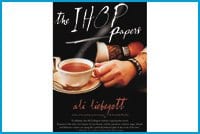From the first paragraph of Ali Liebegott’s second novel The IHOP Papers it’s clear that Francesca, the quirky main character, is no ordinary waitress. “First of all, I’m 20 and I’ve never slept with anyone. I’ve been in AA for three years. That’s how I ended up in San Francisco. I moved here from Southern California to seduce my philosophy teacher from community college, Irene.” It’s good to have a goal, it seems.
In addition to her infatuation with Irene, Francesca is also obsessed with Maria, her AA sponsor, and with Hope, a character in the soap opera Days Of Our Lives. Her quest to win Irene is complicated mainly by the fact that Irene lives in a communal household with two other former students, Gustavo and Jenny, who are both sleeping with her and occasionally with each other — but that’s jumping ahead.
Francesca works at the International House Of Pancakes (IHOP), a US chain of restaurants, where she must wear, she says, “the ugliest waitress dress in existence. Oh, God, if you’ve never seen the uniform, you should. It’s enough to make you want to kill yourself, if you didn’t already want to. It’s navy blue with poofy sleeves and a country floral apron. The rust-colored flowers in the apron match the booths in the smoking section, and the material is a bulletproof polyester blend.”
In or out of the uniform, Francesca is oddly charming, often very funny and more than a little bit crazy. She’s a cutter and quite regularly pulls out a razorblade and does a little work — when she’s waiting for the bus for instance. Liebegott is brutally matter of fact about the cutting — there’s no gloss on the practice and very little in the way of an explanation. She keeps it so casual that it ends up being more disturbing than it would be otherwise. As Francesca explains when she’s musing on the use of razors, “Really, what weren’t the razors for? The razors are for when Irene puts on lipstick before a date with Gustavo. When Maria kisses Ashanti in front of me. When customers don’t leave a tip. After difficult phone calls with the mother. When one of the homeless guys in front of my building gets brought to the hospital. To be carried in my wallet like a condom.”
Francesca also writes poetry and is working on a novel called, of all things, The IHOP Papers, in which she intends to document the loss of her virginity, her sobriety, her conquest of Irene and a whole bunch of stories from the waitressing trenches. The food service anecdotes, like everything in this novel, are often simultaneously comic and pathetic. The New Year’s Eve chapter is fabulously done — the restaurant is packed at two in the morning and drunken customers are attempting to bribe Francesca to get a table, yes, at an IHOP. She almost quits because her boss makes her clean up the vomit in the washroom. The section is every service worker’s nightmare.
As Francesca’s life falls together, as opposed to falling apart, she worries that she needs to stay crazy in order to finish her book. It’s the one arc of the novel that doesn’t quite work. The conceit of the character writing the book seems forced at times, even though the metaphor is entirely appropriate. Sure, part of her project is to be the author of her own life but the literal approach is not satisfying. This is particularly true in light of the ending of the novel — but that would be telling and there are more than few surprises in store by the time the book concludes.
The IHOP Papers is firmly located in the literature of late-adolescent angst/depression with a queer twist. It’s about how hard it can be to come out, even though we think that it’s so much easier now than it was years ago. And it’s about how there seems to be new ways for adolescents to suffer through complicated entanglements and recognizing at the same time there isn’t really any other way to grow up no matter what’s changed and what hasn’t.

 Why you can trust Xtra
Why you can trust Xtra


